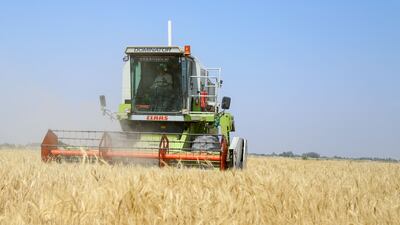Iraq's Trade Ministry has bought about one million tonnes of wheat from local farmers this growing season, a government spokesman said on Thursday.
Mohammed Hanoun said the total amount of wheat received at government silos as of Wednesday stood at about 925 tonnes.
The province of Wasit, to the south of Baghdad, contributed the largest share, at 10,559 tonnes, Mr Hanoun said.
Wasit was followed by provinces of Sahaeddin, north of Baghdad, and Najaf, south of Baghdad, contributing 9,048 tonnes and 5,483 tonnes respectively, he added.
“The marketing season is progressing,” Mr Hanoun said in a statement.
Iraqi farmers usually plant wheat in October and November and harvest it in April and May.
On Tuesday, the Iraqi government decided to increase the price it pays for wheat by 100,000 Iraqi dinars to 850,000 Iraqi dinar (about $575) per tonne, Trade Minister Alaa Al Jabouri said after the weekly Cabinet meeting.
Mr Al Jabouri expected the amount of wheat produced locally to reach 2.5 million tonnes, which will be sufficient to supply the country until the end of the year.
But due to below-average rainfall over the past two seasons and insufficient water in the country’s main rivers — the Euphrates and Tigris — crop failure and lower yield are on the rise.
The World Food Programme estimated in March that cereal production had dropped during to about 5.5 million tonnes in 2020-21, 38 per cent lower than the 8.8 million tonnes grown during the 2019-20 season.
Due to crop failure in rain-fed areas, Iraq needs to import 35 per cent more wheat than last year.
About 3.7 million tonnes of cereal are expected to be imported during the period of 2021 to 2022, the WFP added. This includes two million tonnes of wheat flour and 1.1 million tonnes of rice.
Authorities will also reduce the acreage that will be planted with rice this season due to water scarcity.
The food security situation in Iraq is being exacerbated by the global impacts of the Ukraine-Russia war, pushing up commodity prices on the global market.
The two countries are key suppliers of food, energy and agricultural inputs, globally. Both jointly are responsible for almost one third of global wheat supply.


